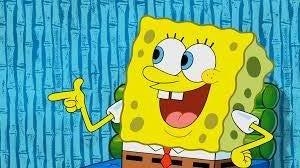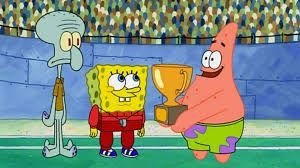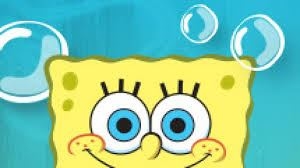 "I'm Ready!"Nick and all related titles, logos and characters are trademarks of Viacom International Inc.Spongebob Squarepants, to some, the name doesn't immediately bring to mind the word hero. Many people view him as a funny and slightly annoying TV personality, who aside from his appearance on Spongebob Squarepants, isn't very relevant. It might seem odd to think of a childhood cartoon character as someone that has a substantial impact on children and adults. However, when looking at the facts, it becomes evident that Spongebob, in the 10+ years on Nickelodeon, has promoted basic fundamental values, with his determination, selflessness, and has created a long-lasting positive impact on children.
"I'm Ready!"Nick and all related titles, logos and characters are trademarks of Viacom International Inc.Spongebob Squarepants, to some, the name doesn't immediately bring to mind the word hero. Many people view him as a funny and slightly annoying TV personality, who aside from his appearance on Spongebob Squarepants, isn't very relevant. It might seem odd to think of a childhood cartoon character as someone that has a substantial impact on children and adults. However, when looking at the facts, it becomes evident that Spongebob, in the 10+ years on Nickelodeon, has promoted basic fundamental values, with his determination, selflessness, and has created a long-lasting positive impact on children.
 Spongebob DeterminationNick and all related titles, logos and characters are trademarks of Viacom International Inc.Determination is a large part of Spongebob’s personality. Even his well-known catchphrase “I’m ready!” that he sings repeatedly on the way to work demonstrates his all-around upbeat spirit and cheerful demeanor. In the episode “The Krusty Krab” Mr.Krabs and Squidward give him an almost impossible task of finding a turbo-charged spatula. While he is on the search the Krusty Krab, Spongebob's potential new employment, is overrun by a crowd of anchovies. It end with Spongebob finding the spatula, rushing in, feeding the massive crowd, and securing his dream Job. This is only one of the many times that Spongebob exhibited his hard working mentality. In another paper written by Jennifer LaRue Huget in The New York Times she claims that, “ To me, the cartoon is equal parts silly, smart and sweet. Its varied cast of characters encourages appreciation of diversity without ever even hinting at that word or that goal. Its writing is clever, its message often heart-warming. And, of course, it’s got one of the most memorable theme songs ever”. The show is geared toward spreading positive spirit and Spongebob Squarepants is the embodiment of that.
Spongebob DeterminationNick and all related titles, logos and characters are trademarks of Viacom International Inc.Determination is a large part of Spongebob’s personality. Even his well-known catchphrase “I’m ready!” that he sings repeatedly on the way to work demonstrates his all-around upbeat spirit and cheerful demeanor. In the episode “The Krusty Krab” Mr.Krabs and Squidward give him an almost impossible task of finding a turbo-charged spatula. While he is on the search the Krusty Krab, Spongebob's potential new employment, is overrun by a crowd of anchovies. It end with Spongebob finding the spatula, rushing in, feeding the massive crowd, and securing his dream Job. This is only one of the many times that Spongebob exhibited his hard working mentality. In another paper written by Jennifer LaRue Huget in The New York Times she claims that, “ To me, the cartoon is equal parts silly, smart and sweet. Its varied cast of characters encourages appreciation of diversity without ever even hinting at that word or that goal. Its writing is clever, its message often heart-warming. And, of course, it’s got one of the most memorable theme songs ever”. The show is geared toward spreading positive spirit and Spongebob Squarepants is the embodiment of that.
His wholehearted desire to help everyone helps him release positive energy. Spongebob is motivated for the right reasons. “He seems to me to represent a child, someone who lives for the moment, has no idea about the value of money or power and could care less about social status or physical pursuits. He enjoys hanging out with his friends, blowing bubbles and working hard at his job because he is excellent at grilling patties, not because he wants to earn a salary. His attitude is infectious, and his wonderful enthusiastic qualities usually trump those of the other characters” (The Huffington Post). His motivations are driven from his genuine desire to do them. He has no other ulterior motives.
 Always a smileNick and all related titles, logos and characters are trademarks of Viacom International Inc.In the same paper by The Huffington Post, they addressed the idea that Spongebob promoted basic fundamental values. The list of most common universal values are compassion, honesty, fairness, respect, determination, and ambition. The author, who earned a PhD in psychology from UCLA and now is a Child Development Expert, explained that, “I have come to believe that SpongeBob SquarePants teaches children many of these fundamental lessons about basic human values in a non-preachy manner through the authentic actions of its characters”. The reason why Spongebob is so interesting to all ages is because it has an interesting, and dynamic plot line. Unlike many kids shows that follows the same repetitive pattern every episode, “where is the yellow house?”, “can you point to the map?”, “where is the lake?” questions like these become dull and boring. But Spongebob teaches more than just how many apples are in a basket, he teaches children about life through his crazy and fun adventures. This cartoon is a satire of US culture, and it contains a surprising number of innuendos and jokes that appeal to adults and children alike.
Always a smileNick and all related titles, logos and characters are trademarks of Viacom International Inc.In the same paper by The Huffington Post, they addressed the idea that Spongebob promoted basic fundamental values. The list of most common universal values are compassion, honesty, fairness, respect, determination, and ambition. The author, who earned a PhD in psychology from UCLA and now is a Child Development Expert, explained that, “I have come to believe that SpongeBob SquarePants teaches children many of these fundamental lessons about basic human values in a non-preachy manner through the authentic actions of its characters”. The reason why Spongebob is so interesting to all ages is because it has an interesting, and dynamic plot line. Unlike many kids shows that follows the same repetitive pattern every episode, “where is the yellow house?”, “can you point to the map?”, “where is the lake?” questions like these become dull and boring. But Spongebob teaches more than just how many apples are in a basket, he teaches children about life through his crazy and fun adventures. This cartoon is a satire of US culture, and it contains a surprising number of innuendos and jokes that appeal to adults and children alike.
Aside from fundamental values it introduces an understanding of personal life and human interaction “Both children and adults are presented with the ongoing conflicts that accompany living in a personal society. Within the happenings of Bikini Bottom, younger audience members are given a sophisticated understanding of life” (The American Journal of Contemporary Research). The show and Spongebob’s interactions with his pet snail, friends, family, and strangers shows an array of different life, not only instilling a realistic style of living, but a realistic living environment. From this children and adults gain a sense of reality, and an understanding of context. “Ask even a young child if Squidward likes SpongeBob, and he knows the answer is "No." So I ask, "Why doesn't SpongeBob get it? Why does he keep trying to play with Squidward?" Good question, and one that relates to many kids who keep seeking out the wrong kids at the playground. There's another episode where SpongeBob eats a smelly concoction, and then doesn't understand why everyone avoids him. He takes it to mean that people don't like him. He missed the bigger picture and made the wrong conclusion. That's an idea worth discussing.” said Marcia Eckerd PhD She explains that Spongebob’s interactions allow kids to think at a higher level, encouraging them to make inferences by analyzing social and physical cues. This means that kids, from an earlier age, begin to draw from context rather than using the information that's laid out for them.
It’s difficult to interpret such a nostalgic childhood character as a symbol of the qualities we need in America, but he is. We need people who are determined, kind, and open to diversity and social interaction. People who encourage others to think beyond the necessary, and promote fundamental human values.
Cited Sources:
Eckerd, Marcia. “Children and Television: Is SpongeBob Bad for Your Child?” Psychology Today, Sussex Publishers, 17 Sept. 2011, www.psychologytoday.com/blog/people-skills/201109/children-and-television-is-spongebob-bad-your-child.
Uhls, Yalda T. “My Psychological Theory about SpongeBob SquarePants.” The Huffington Post, TheHuffingtonPost.com, 8 May 2012, www.huffingtonpost.com/yalda-t-uhls/spongebob-squarepants_b_1500534.html.
Huget, Jennifer LaRue. “SpongeBob's Effect on Kids' Brains.” The Washington Post, WP Company, 12 Sept. 2011, www.washingtonpost.com/blogs/the-checkup/post/spongebobs-effect-on-kids-brains/2010/12/20/gIQAoTphFK_blog.html?utm_term=.65b65a2cbb5d.
Britni A. Tarr, and Timothy J. Brown. “Http://Jllesite.org/Sayilar/7/7.Pdf.” Journal of Language and Literature Education, vol. 2, no. 7, 2013, doi:10.12973/jlle.11.207.
Foy, Joseph J. SpongeBob SquarePants and Philosophy: Soaking up Secrets under the Sea!Open Court, 2011.
Page created on 1/10/2018 3:43:04 AM
Last edited 1/16/2018 7:41:18 PM
